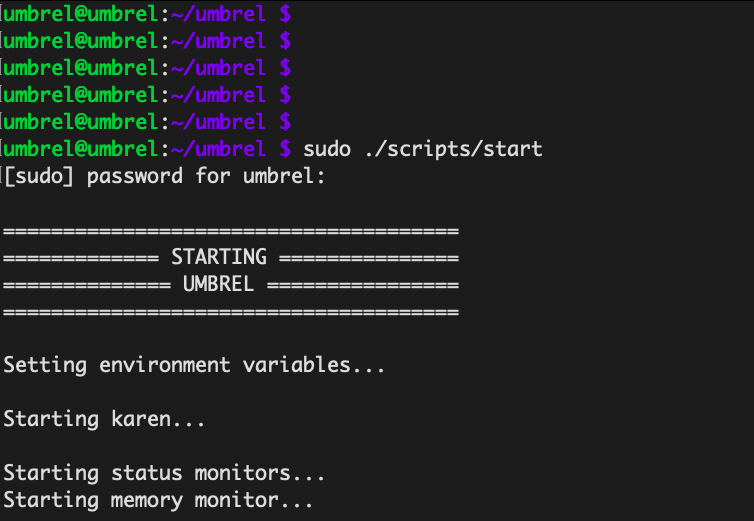I wanted to copy the fully-synced #Bitcoin blockchain data from my @getumbrel node to a new raspi that I'm setting up.
Quick 🧵on how to do it:
Quick 🧵on how to do it:

* First you have to STOP the Umbrel services but keep its Pi running.
You want the Bitcoin Core data to be frozen in time so that it doesn't get out of sync with itself when you're copying (which will take a while).
In order to stop Umbrel...
You want the Bitcoin Core data to be frozen in time so that it doesn't get out of sync with itself when you're copying (which will take a while).
In order to stop Umbrel...
* `ssh` into your Umbrel node. Password is the same as the web UI.
ssh umbrel@umbrel.local
If you can't resolve `umbrel.local`, you can use its IP addr:
ssh umbrel@192.168.x.y
ssh umbrel@umbrel.local
If you can't resolve `umbrel.local`, you can use its IP addr:
ssh umbrel@192.168.x.y

* `cd` into the `umbrel` dir.
* Run the `stop` script.
The `sudo` password is once again the same as the web UI.
* Run the `stop` script.
The `sudo` password is once again the same as the web UI.

* ssh into your new Raspi (e.g. `ssh pi@raspberrypi.local`; default password is "raspberry").
* Use `scp` to copy these three blockchain dirs from your Umbrel node over the network.
(obv adjust the output dir for your setup)
* Use `scp` to copy these three blockchain dirs from your Umbrel node over the network.
(obv adjust the output dir for your setup)

* Install Bitcoin Core on the new Raspi (whole separate 🧵).
* Test it out by manually running `bitcoind` and verify that it starts up and is happy w/the blockchain data.
CTRL-C to kill it.
* Configure Raspi to run `bitcoind` automatically.
* Test it out by manually running `bitcoind` and verify that it starts up and is happy w/the blockchain data.
CTRL-C to kill it.
* Configure Raspi to run `bitcoind` automatically.
• • •
Missing some Tweet in this thread? You can try to
force a refresh








